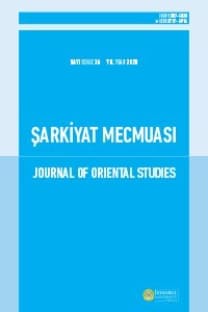Mecid Emced’in “Münih” Şiirinde Aşk, Özlem ve Anıların Canlandırılması
Bu çalışmanın amacı şair Mecid Emced’in “Münih” (1958) adlı şiirinde geçen hatıraların nasıl ve neden aktarıldığını incelemektir. Hatıralar ortak duygu ve düşüncelerden hareketle bireysel yaşanmışlıkların dile getirilmesidir. Bireysel hafızanın en önemli parçası olan bireysel deneyimler, hatıraların anlatımı veya aktarımı sırasında öyküleştirilerek hafızada yerini sağlamlaştırır. Hatırlama bir süreçtir ve hatıralar da bu sürecin yansımalarıdır. Dolayısıyla hatıralar bir öyküye dönüştüğünde hafızada yerini sağlamlaştırır ve yeniden yorumlanmak için hazır bekler. Şiire adını veren Almanya’nın “Münih” şehri, Mecid Emced’in bireysel hafızasında belirli bir yere işaret eden aşkın mekânıdır ve bu mekânı konu edinerek aşkını hatırlatmak ister. Bu bir yandan şairin yaşadığı zamana, onun ana diline ve ait olduğu toplumun geleneğiyle bağlantılı olan gerçekliğe diğer taraftan da ona ilham veren kadının otobiyografisine ait simgesel ve tarihi gerçekliğe dayanmaktadır. Gerçekte Pakistan dışında hiç bulunmayan şairin hafızasında yer etmiş olan Münih şehri, Charlotte’un sadece ona anlattıklarından ibarettir. Charlotte’un bireysel hafızasından aktardığı semantik bilgiler ve epizodik olaylar şair Mecid Emced’e ilham kaynağı olur. Bu bağlamda şair, Charlotte’un şehri olan Münih’e dair bu verilerden yaralanarak, onunla ortak bir hayatı paylaşmamış olmasına rağmen sevdiği kadının ona anlattıklarıyla ve az sayıda fotoğrafın yardımıyla zihninde bir Münih yaratır. Charlotte’un Münih’i artık Mecid Emced’in bireysel hafızasında yerini alır ve böylece şiirinde kendisinin hiç bulunmadığı Münih’e sanki gitmiş gibi şehri anlatır. Bu çalışmada ayrıca şiirde Charlotte’un aktardığı bilgiler veya anılar ışığında kültürlerarası aktarımın nasıl kurgulandığı Maurice Halbwachs, Jan ve Aleida Assmann’ın bellek kuramları aracılığıyla irdelenmiştir.
Anahtar Kelimeler:
Kolektif Hafıza, Bireysel Hafıza, Hatıra, Mecid Emced, Münih
Exploring Love, Yearning, and Memories in Majeed Amjad’s Poem “Munich”
The study explores the process and reasons behind the transfer of memories in the poem “Munich” (1958) by Majeed Amjad. Memories are a way of expressing the personal experiences that are shaped by our thoughts and emotions. These experiences are a crucial part of memories and become more firmly entrenched when shared through storytelling. Remembering is a process, and memories are a reflection of that process. When memories are transformed into stories, they become more deeply ingrained in our minds and become open to reinterpretation. The poem “Munich” is named after the city of Munich in Germany, a place of love for Majeed Amjad and a reminder of his love for someone. This choice of location was influenced by the poet’s historical and cultural context, as well as the autobiographical details of the woman who’d inspired him. By choosing Munich as the setting, Amjad drew upon both the reality of his society and language and the symbolic significance of the place in his memories. The poet Majeed Amjad, who had never left Pakistan, created a vivid image of Munich in his poem named after the city based on the information and memories Charlotte, a German woman he’d met briefly in 1958, had shared with him. Despite not experiencing the city firsthand, he constructed an image of it in his mind through Charlotte’s descriptions and a few photographs, and this allowed him to create a poetic representation of Munich. Using the memory theories of Maurice Halbwachs and Jan and Aleida Assmann, this study also explores how the transfer of intercultural information and memories has been depicted in the poem through Charlotte’s contributions to the poet’s understanding of the city.
Keywords:
Collective Memory, Individual Memory, Memoir, Majeed Amjad, Munich,
___
- Agha, Vazir. Majeed Amjad ki Dastan-e Mohabbat. Lahor: Moeen Academy, 1991. google scholar
- Amjad, Majeed. Shab-i Rafta ke Ba‘d. Lahore: Majeed Amjad Ishaati Committee, 1976. google scholar
- Amjad, Majeed. Shab-i Rafta. Lahore: Al-Hamd Publications, 2007. google scholar
- Assmann, Aleida. Zur (Un-) Vereinbarkeit von Leid und Schuld in der deutschen Erinnerung. Zeitgeschichte 2/33 (2006). google scholar
- Assmann, Jan. Kültürel Bellek/ Eski Yüksek Kültürlerde Yazı, Hatırlama ve Politik Kimlik. Çev. Ayşe Tekin. İstanbul: Ayrıntı Yayınları, 2015. google scholar
- Butzer, Günter and Jacob, Joachim. Metzler Lexikon Literarischer Symbole. Stuttgart/Weimar: Verlag J.B.Metzler, 2008. google scholar
- Erll, Astrid. Kollektives Gedachtnis undErinnerungskulturen. Stuttgart/Weimar: Walter de Gruyter, 2005. google scholar
- Fârooqi, Mehr Afshan. “The Legacy of the "Wisfu" Poet: Repositioning Majıd Amjad in the Modern Urdu Canon”. BUNYÂD. 6 (2015): 45-78. google scholar
- Frenzel, Elisabeth. Stoff-,\otiv- und Symbolforschung. Stuttgart: J.B. Metzlersche Verlagsbuchhandlung, 1963. google scholar
- Halbwachs, Maurice. Das Gedachtnis und seine sozialen Bedingungen. Frankfurt: Suhrkamp Verlag,1985. google scholar
- Halbwachs, Maurice. KolektifBellek. Çev. Zuhal Karagöz. İstanbul: Pinhan Yayıncılık, 2018. google scholar
- Nora, Pierre. Hafıza \ekânları. Çev. M.Emin Özcan. Ankara: Dost Kitabevi, 2006. google scholar
- Qasim Mehmood, Syed. Encyclopedia Pakistanika. Lahore: Al-Faisal Nashran, 2014. google scholar
- Rubin, David. C. “A Basic Systems Approach to Autobiographical Memory”. Current Directions in Psychological Science. 14/2 (2005): 79-83. google scholar
- Url-1: https://dunya.com.pk/index.php/column-detail-print/34023. Access date: Jan. 2023. google scholar
- Url-2: https://razarumi.wordpress.com/2006/09/15/remembering-the-lost-voice-majeed-amjad/. Access date: Dec. 2022. google scholar
- Url-3: https://www.dawn.com/news/1124666. Access date: Nov. 2022. google scholar
- Uzer, Tuğba. “Nasıl Hatırlarız, Nasıl Unuturuz: Kuramsal Yaklaşımlar”. Hayatı Hatırlamak, Otobiyografik Belleğe Bilimsel Yaklaşımlar içinde (51-70). Edt. Sami Gülgöz, Berivan Ece, Sezin Öner. İstanbul: Koç Üniversitesi Yayınları, 2018. google scholar
- Zakariya, H. Muhammad. Kulliyat-ı \ecid Emced. Lahore: AlHamd Publications, 2006. google scholar
- Williams, Helen L. and Conway, Martin A. “Networks of Autobiographical Memories”. In \emory in \ind and Culture (p.33-61). (Eds.) Pascal Boyer, James V. Wertsch. Cambridge: Cambridge University Press, 2009. google scholar
- ISSN: 1307-5020
- Yayın Aralığı: Yılda 2 Sayı
- Başlangıç: 1956
- Yayıncı: İstanbul Üniversitesi Edebiyat Fakültesi Şarkiyat Araştırma Merkezi
Sayıdaki Diğer Makaleler
Alt Kıtada İngiliz Hakimiyeti, Edebi Akımlar Ve Fesadat Dönemi Yazarlarından Kudretullah Şahab
Güler DOĞAN AVERBEK, Thoralf HANSTEIN
Klasik Arap Şiirinde Eleştiri Ölçütü: Ebû Ali el-Merzûkî’de Amûdü’ş-şi‘r Kavramı
Hatice DEREBAŞI, Şükran FAZLIOĞLU
Devâzdeh-bend-i Muhteşem’in Refî‘ Tarafından Yapılmış Bilinmeyen Tercümesi
Mecid Emced’in “Münih” Şiirinde Aşk, Özlem ve Anıların Canlandırılması
Modern Ürdün Lehçesinin Fonetik ve Morfolojik Özellikleri Üzerine Bir İnceleme
